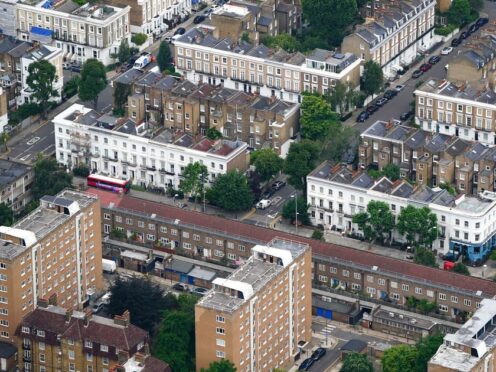
Leasehold reforms proposed by the Government have been branded an “eviscerated shell of a bill” that fails to deliver on Conservative election promises.
It comes as ministers face pressure to go further on the legislation, including ending the creation of so-called “fleecehold estates”, which have been called “the next great scandal” facing the housing market.
Leaseholds are a form of home ownership that gives the householders the right to live in a property for a fixed number of years but can also mean having to pay service charges to the freeholder, who owns the land.

The Leasehold and Freehold Reform Bill has faced criticism in the House of Lords during peers’ first debate on the legislation because it fails to outlaw this housing system branded “feudal” by Levelling Up Secretary Michael Gove.
While the Bill bans the sale of new leasehold houses, except in exceptional circumstances, it does not ban the sale of new leasehold flats, which make up 70% of properties affected.
Labour’s housing spokesperson Baroness Taylor of Stevenage said: “From the original vision for the Bill, what we have before us today is a virtually eviscerated shell of a bill.”
She added that it has “little to give comfort to the people and families who had hoped to realise their dream of homeownership, and have found instead that being a leaseholder simply does not offer the security and control of their lives that their dream promised”.
The frontbencher added: “This Bill is a very long way from what leaseholders have been waiting and hoping for, and that is an end to the injustice of the anachronistic leasehold system.”
Lady Taylor said the omission of a ban on new leasehold flats justifies her description of an eviscerated bill because it “means the Bill simply won’t do what it sets out to do”.

Former Chief of Staff to Boris Johnson in Downing Street Baroness Finn also pressed the Government to stick to its manifesto commitment of banning all leasehold homes.
She said: “Boris Johnson secured a substantial majority just five years ago on a manifesto that included the promise to implement a ban on the sale of new leasehold homes.
“The Government has sought to suggest that banning leasehold houses fulfils this promise. It does not, for the majority of leaseholders are in flats.”
She added: “I suggest that the Government takes the power to allow the Secretary of State to end all leaseholds on permitting here that it will only be commenced once the market was ready.”
Meanwhile, 46 MPs have written to the Government calling for an end to “fleecehold” agreements, whereby people with freehold properties can be locked into contracts with private companies to maintain communal areas around them.
In a letter addressed to Mr Gove, the MPs – including two former housing ministers – highlighted “problems with the unadopted, private estates model”.
They called on the Government to “go further to empower residents on existing Fleecehold estates, and to end this model for new estates”.
Tory peer Lord Moylan, a former advisor to Boris Johnson when he was Mayor of London, said: “I think this (‘fleecehold’) is the next great scandal approaching the housing market.
“It is in very large measure attributable to councils who are simply resiling from taking on their duties.
“They will accept the additional council tax that is generated by the new properties but they will not take on the responsibilities for maintaining those common amenities.”
Responding to “fleecehold” concerns, housing minister Baroness Scott of Bybrook said: “It is up to the developers and the local planning authority to agree on specific issues relating to new development, including appropriate funding and maintenance arrangements.”
She said the Government was “carefully considering” a report by the Competition and Markets Authority (CMA) into problems faced on such unadopted new-build estates.
As well as strengthening consumer protections, the regulator is also considering increasing the extent to which amenities are taken on by councils.
Earlier, Lady Scott told peers that the Bill would ban new leasehold houses other than in exceptional circumstances.
She added: “Flats on the other hand have shared fabric and infrastructure and therefore require some form of arrangement to facilitate management and this has historically been facilitated by a lease.
Nonetheless the Government recognises the issues in the leasehold system and I have heard the concerns regarding a lack of commonhold measures as a meaningful alternative to replace leasehold for flats.
“I want to reassure you that the Government remains committed to the commonhold reform and we see it as long-term replacement for leasehold.”

Enjoy the convenience of having The Sunday Post delivered as a digital ePaper straight to your smartphone, tablet or computer.
Subscribe for only £5.49 a month and enjoy all the benefits of the printed paper as a digital replica.
Subscribe